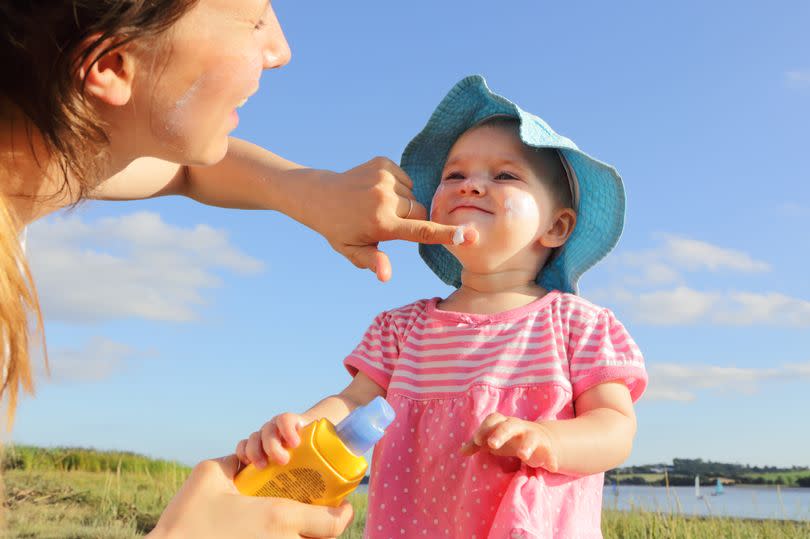'Dangerous' TikTok sun cream trend could be damaging your health

Medical professionals and skin care experts caution against a new risky trend on TikTok known as the anti-sun cream movement. The movement is gaining traction, with social media influencers urging followers to avoid sun cream entirely - an advice allegedly grounded in baseless claims about harmful impacts of sun cream on our health.
These influencers are trending with their content discouraging the use of sun cream. An influencer whose video gained over 1.2 million views declared: "I don't wear sunscreen, and I never will.
"We blame the sun for cancer when we should be blaming our diets. Sunscreen and a poor diet will make you sick."
Get the latest news straight to your phone by joining us on WhatsApp
As per fresh data released by Glam, the trend has had an influence on Google search tendencies. Searches asking "Does sunscreen cause cancer" have risen 160% over the recent month.
Most alarmingly, searches for "free skin cancer screening near me" and "How do I know if I have skin cancer" have seen an increase of 400% and 250% respectively, implying that this trend is breeding worry amongst people, reports Gloucestershire Live.
So what does a skin care specialist have to say about this controversial TikTok trend?
"Seeking health advice from content creators can be dangerous," warned Dr. Mariano Busso, a board-certified cosmetic dermatologist based in Beverly Hills, speaking to Glam. He emphasised the importance of sun cream, stating: "Using sun cream has been scientifically proven to protect skin from the harmful effects of ultraviolet light, including both UVB and UVA rays. By not using sunscreen, you are greatly increasing your odds of sun cancer,".
In addition to this, he cautioned that neglecting sun cream accelerates skin ageing, making one appear older. Dr. Mariano clarified that sun cream does not cause cancer.
Does sun cream cause skin cancer?
Cancer Research UK asserts that overexposure to ultraviolet (UV) radiation from the sun can damage skin cells and lead to skin cancer. In the UK, nearly 9 out of 10 cases of melanoma skin cancer could be prevented by practising safe sun exposure and avoiding sunbeds.
Skin cancer can affect anyone, but some individuals may be at a higher risk, particularly those who burn more easily.
Added protection to reduce health risks:
Regardless of location, whether at home or on holiday, it's crucial to shield oneself from the sun. The sun's strength is often enough to cause damage in the UK between mid-March and mid-October, even on cold or cloudy days.
Spend time in the shade. This is especially important between 11am and 3pm in the UK
Cover up with clothes, a wide-brimmed hat and UV protection sunglasses.
Apply sunscreen with at least SPF 30 and 4 or 5 stars. Use it generously, reapply regularly and use together with shade and clothing.
Even on cloudy, windy, or cooler days, sunburn is still a possibility. Over 90% of UV rays can penetrate through clouds, so it's important to seek shade, cover up, and apply sun cream.
Tips for using sun creams:
Cancer Research UK has highlighted several factors to consider when selecting and applying sun cream. Neglecting these could potentially result in severe health problems down the line:
Choose a lotion, pump spray or roll-on product, not an aerosol. Aerosol sunscreens can be patchy and do not provide a thick-enough layer for protection.
Make sure you put enough on – people often put on much less sunscreen than they need to. Apply sunscreen evenly and thickly.
Reapply sunscreen regularly throughout the day including ‘once a day’ and ‘water resistant’ products. Sunscreen can rub, sweat or wash off – even if it’s supposed to be waterproof. It’s especially important to put more on after swimming, sweating or drying off with a towel.
Reapplying also helps you to cover more of your skin and not miss any areas.
Use sunscreen even if you have SPF in your moisturiser or makeup, as those products don’t give a thick-enough layer of protection on their own. And they aren’t usually reapplied.
Check the expiry date on your sunscreen before you use it. Look for a symbol with an open lid, the letter M and a number. This shows how many months the sunscreen will last once open.

 Yahoo News
Yahoo News 
